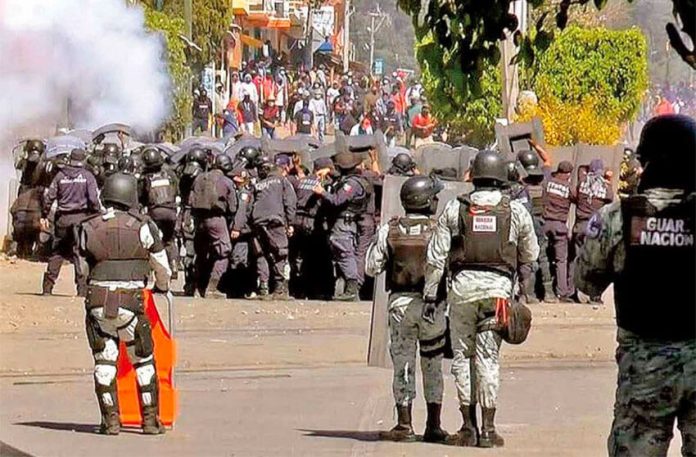At least 11 people were injured during protests by militant teachers in Michoacán on Tuesday.
The radical wing of the CNTE teachers union, Poder de Base (Power Base), has attempted to block train tracks in Morelia, Pátzcuaro and Uruapan since Monday, attacking security forces with rockets, sticks, stones and pipes.
Most of the violence was concentrated in Caltzontzin on the outskirts of Uruapan, where at least 11 police and National Guardsmen were hurt — two seriously — and taken to hospital. Security forces numbered around 350 and protesters were about 400-strong.
After being repelled from the train tracks, some of the militants burned tires and tried to block the Siglo 21 highway near Tiripetío, 25 kilometers southwest of Morelia, the exact location of another clash on January 17, but were cleared by police.
The protesters were demanding the payment of wages, consultation before any changes to pensions and jobs to be automatically awarded to teachers who have completed their training, a perennial demand by teaching students and the dissident CNTE union.
🚨 #AMPLIACIÓN | Al menos 20 uniformados han resultado lesionados en el enfrentamiento de profesores agremiados a la #CNTE con elementos de la @GN_MEXICO_.
➡ https://t.co/GYhMt4vnd4 pic.twitter.com/gpLPTlEFal
— Excélsior (@Excelsior) February 1, 2022
They were also unhappy over the appointment of a new director of indigenous education, the newspaper Excélsior reported.
The state Education Ministry said it was up to date with payments to teachers.
The state Public Security Ministry (SSP) said in a statement that only peaceful protests would be tolerated. “The SSP emphasizes that it endorses total respect for free demonstration framed within legality, which doesn’t affect third parties. [The ministry] emphasizes that illegal acts masked as demonstrations which try to destabilize Michoacán society will not be allowed.”
Blockades are a common tactic for dissatisfied teachers and teachers-to-be in Michoacán and other states: members of the CNTE blocked tracks for 91 days last year, costing businesses an estimated 50 million pesos per day (US $2.5 million at the exchange rate at the time).
With reports from El Universal, Infobae and Excélsior
